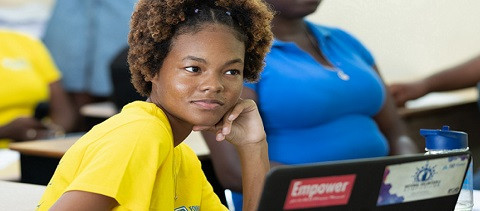
GCED Basic Search Form
Quick Search
You are here
News

Media and information literacy recognizes the primary role of information and media in our daily lives. It is at the heart of freedom of expression and information - because it enables citizens to understand the functions of the media and other information providers, to critically evaluate their content and to make informed choices as users and producers of information and media content.
Therefore, empowering people through media and information literacy (MIL) is an important prerequisite for promoting equal access to information and knowledge and fostering free, independent and pluralistic media and information systems.
Now, in the midst of the Covid 19 crisis, Media and Information Literacy (MIL) is more critical than ever: the current digital age, combined with the crisis of people staying at home and working from a distance and consuming news and information via digital platforms, has created an even greater need for connectivity, networking and interdependence.
In order to strengthen media and information literacy among students and entire societies, training of teachers is vital.

UNESCO's task is to promote MIL in all societies by embedding it in the teacher curriculum and developing guidelines for the development of national MIL policies and strategies. UNESCO has published the Curriculum for Media and Information Literacy for Teachers in 2011 to enable teachers with pedagogical approaches to integrate MIL into their classrooms.
By focusing on teachers, UNESCO hopes to harness the potential of the multiplier effect. This means that teachers of media and information literacy should promote the media and information literacy of their students and thus lead to media and information literate societies.
On 30 July 2020, UNESCO's Cluster Office in the English and Dutch-speaking Caribbean organized sub-regional consultations with experts and practitioners in media and information literacy, including teachers, information and media professionals.
During the virtual consultation, the content of the existing curriculum was discussed in order to update the text for a second edition of the MIL curriculum and the draft global standards for MIL curriculum guidelines.
The Caribbean Consultation on the MIL curriculum highlighted the many regional challenges in the Caribbean SIDS in terms of promoting media and information literacy for sustainable development, but also shed light on the different barriers at the national level. Policy makers need to be aware of the importance of MIL in order to promote it and include it in the national curriculum for teachers. Isabel Viera, UNESCO Advisor for Communication and Information at the Caribbean Cluster Office, urges that the UNESCO MIL curriculum be constantly updated to avoid a further widening of the digital divide.
The experts participating from 10 English and Dutch Caribbean Countries and Territories discussed paragraph by paragraph and proposed changes to update the UNESCO MIL curriculum or include it in the second edition. As the COVID 19 crisis has shown, the experts call in particular for consideration of the dismantling of "false messages", including an appropriate definition of misinformation and disinformation
The media and information literature course for teachers is an essential tool that empowers teachers to share knowledge with students on the use and understanding of media and information tools. We must act quickly to ensure that teachers receive the necessary professional support
-- Katherine Grigsby, Director, UNESCO Cluster Office for the Caribbean

Ms Dorcas R. Bowler National Library and Information Services of the Bahamas Ministry of Education raised the critical point that MIL is not only about computer skills, but also includes the ability to think critically. However, to address national challenges, closer cooperation and communication between Caribbean SIDS should be encouraged.
Dr. Paulette Stewart, Head of the Library and Information Science Department at the University of the West Indies, Jamaica, agreed to include in the curriculum the consideration of the special developmental position of SIDS.
In the same context, Kiran Maharaj, Director of the Media Institute of the Caribbean, stressed the integration of radio into the media dialogue. "In the Caribbean, radio still has a very broad use and reach - if we want to make a difference here, one component must be included via the media". She also urges more "real life activities with the media", e.g. partnerships with media houses, they could invite students to teach and show the media world.
Cordel Green, Executive Director of the Jamaica Broadcasting Commission, argues on the importance of understanding the role and powers of the various media actors, whether public or private, as well as Amazon and Facebook and other major technology companies that influence the media landscape.
Other points of discussion included ensuring human rights, freedom of expression and access to information in the debate on MIL, controlled and healthy media use, especially among minors, and the emphasis on digital rights and digital security.
We need a different approach to critical thinking - we need to bring critical thinking back into the curriculum in Caribbean schools as it is an essential part of media and information literacy
-- Kiran Maharaj, Director Media Institute of the Caribbean
Mr Alexandre La Voci, UNESCO Co-Chair GAPMIL International, highlighted MIL as a process of lifelong learning. He also affirmed that the curriculum needs to be constantly updated, to stay ahead of the time. As practical solution he suggests the introduction of online courses for teachers and trainers, which must also be constantly updated in line of the advancement of digital solutions in the media and information landscape. The MIL curriculum must also be inclusive and serve all levels from the classroom to policy makers.
URL:
https://en.unesco.org/news/placing-media-and-information-literacy-heart-education-2
